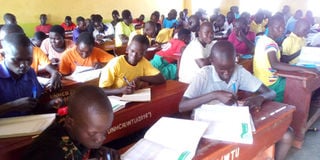Lack of secondary schools leaves refugees hopeless

Pupils of Twajiji Primary School attend lessons recently. Some of these pupils say the future of their education is in limbo due to lack of secondary schools. Photo by Paul Tajuba
What you need to know:
- Officials at Finn Church Aid say at least 6,000 learners who completed Primary Leaving Examinations and qualified to join secondary school for the past two academic years have failed to do so owing to lack of competent schools in the camp.
Mark Donike, 20, is enthusiastic about writing his Primary Leaving Examinations (PLE) this year. The excitement stems from the fact that his dream of becoming a medical doctor is back on track, having restarted school in 2016. The war in South Sudan had destroyed his dream of getting an education.
This explains why he started school late and is way older than most pupils in his class, but Donike says age is just a number and cannot deter him from pursuing his dream. “I feel good when I am in class. When teachers come, we are all learners. I concentrate like any other pupil,” he said.
Just like Donike, Jennifer Poni, 14, is in Primary Five and her eyes are set at becoming a teacher. “Teachers here tell us to be peaceful. I also want to teach about peace back home such that people stop fighting,” she says.
The two learners are among the 3,000 refugee children from South Sudan studying at Twajiji Primary School in Bidi Bidi, Yumbe District hoping to change their communities through education.
“We have the ability to study like other children. I want to become a doctor such that I can treat fellow refugees. If they continue giving us support, many of my fellow refugees will attain their dreams,” Donike adds.
With an open refugee policy where migrants move freely, have equal access to primary education, healthcare and work, Donike and Poni are some of the 1.1 million refugees residing in Uganda.
According to government data, 90 per cent of refugees are from South Sudan and the DR Congo.
Limited support
But the two learners’ dreams are not entirely in their hands. To get where they are now, it has been the generosity of Uganda and the donor community. And this support, at least for now, has limitations that have barred thousands of deserving learners to transit from primary to secondary level.
For basic humanitarian assistance to refugees, including education, government partners with different humanitarian organisations such as Finn Church Aid (FCA), which takes care of all learners’ educational needs, including providing scholastic materials, building classrooms and paying teachers, among others.
Lilian Maate Musoki, a senior manager at the FCA, says at least 6,000 learners who completed their PLE and qualified to join secondary for the past two academic years have failed to do so, owing to infrastructural and inadequate educational materials and few teachers.
“Secondary education still has gaps. Even our attention as Finn Church Aid and with other donors is mainly centered on primary education,” Maate said during a meeting with Finish vicars who toured the biggest refugee settlement, Bidi Bidi, last month.
“We have 3,000 students who would have joined secondary education in 2017 but did not. If we consider those who sat primary in 2018, they are 6,000 or more,” she said.
About 200 metres from Twajiji Primary School, is Nipata Valley Secondary School which has 14 teachers. It is this school that Bonike and Poni intend to join but the school does not have a library, science laboratory and enough classrooms.
Quality of the school
Lucy Lekuru, the school deputy head teacher, says a lot needs to be done if learners are to study, especially in regards to science subjects.
“The first thing that needs to be done is teachers’ accommodation. We have been here for two years but winds came and swept off the roofs [on houses]. Besides now that sciences are being emphasised in Uganda, we need a laboratory and a library,” Lekuru said.
“Last year, our students sat their exams at another school and they were ignorant about most practical exams. They had never touched any laboratory equipment and were doing so for the first time and in an exam,” she exclaimed.
But Maate said they are now prioritising both primary and secondary education in their next budgeting. Finn Church Aid, he said, is targeting to enrol 71,000 learners in Primary and 7,500 in secondary.
According to the United Nations High Commission for Refugees, in a recent report, said at least Shs1.6 trillion is needed to support refugees in Uganda next year.
The support would include providing education. According to the agency’s budget report for 2019, the money will be used to expand education services, environmental protection and livelihood programmes.




